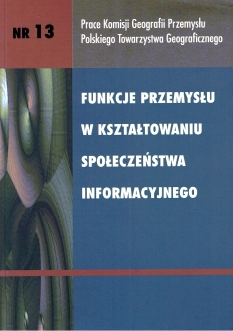Location of firms and spatial behaviour of employees of the IT sector (the case of the Poznań metropolitan area)
DOI:
https://doi.org/10.24917/20801653.13.2Keywords:
lokalizacja, informatyka, PoznańAbstract
In the contemporary world, areas characterised by the development of the information economy and society are of particular importance. This article has two goals: a theoretical and an empirical one. From a theoretical perspective, an attempt is made to answer the question of how the growth of the IT sector changes the traditional concepts of industrial location and regional development. The empirical part presents the preliminary results of a research carried out under the international project “Accommodating Creative Knowledge: Competitiveness of European Metropolitan Regions within the Enlarged Union” (ACRE). They show the state, dynamics and spatial structure of the analysed sector as well as the spatial behaviour of its employees in the Poznań metropolitan area. The article concludes with a distinction of two development pathways of the IT sector: catching up with the more advanced Western economies and societies, and utilising the endogenous human capital.Downloads
Metrics
References
Boschma R. A., Fritsch M., 2008. Klasa kreatywna a rozwój regionów w Europie, Problematyka przyszłości regionów, [w:] Jakubowska P., Kukliński A., Żuber P. red., W poszukiwaniu nowego paradygmatu, Ministerstwo Rozwoju Regionalnego, Warszawa.
Clark T. N., 2003, The city as an entertainment machine, Elsevier.
Crone M., 2003, Clustering and cluster development in knowledge-intensive industries: a ‘knowledge and learning’ perspective on new firm formation and firm-building/firm growth in Ireland’s indigenous software industry, 33rd Annual Conference of RSA: British and Irish Section, St Andrews.
Dziemianowicz W., 2008, Konkurencyjność gmin w kontekście relacji władze lokalne – inwestorzy zagraniczni, Wydawnictwa Uniwersytetu Warszawskiego, Warszawa.
Florida R., 2002, The rise of the creative class and how it’s transforming work, leisure, community and everyday life, New York.
Florida R., 2005, Cities and the creative class. New York.
Hoover E. M., 1948, The location of economic activity, McGraw-Hill, New York (tłum. pol.: Lokalizacja działalności gospodarczej, Warszawa 1962). McCann P., Sheppard S., 2003, The Rise, Fall and Rise Again of Industrial Location Theory, „Regional Studies”, vol. 37/6–7.
Muent H., 2000, Localised co-operation between small firms in the socio-economic transition process in Poland. Two cases from the Poznań region, [in:] Polish economy in transition: spatial perspectives, Bogucki Wydawnictwo Naukowe, Poznań.
Stryjakiewicz T., Kaczmarek T., Męczyński M., Parysek J.J., Stachowiak K., 2007, Poznań faces the future. Pathways to creative and knowledge-based regions. AMIDSt (Amsterdam Institute for Metropolitan and International Development Studies), Amsterdam.
Stryjakiewicz T., 2008a, Regiony kreatywnej wiedzy – zarys międzynarodowego projektu badawczego ACRE, [w:] Czyż T., Stryjakiewicz T. red., O nowy kształt badań regionalnych w geografii i gospodarce przestrzennej, Biuletyn KPZK PAN, z. 237.
Stryjakiewicz T., 2008b, Rozwój sektora kreatywnego w regionach metropolitalnych, [w:] Stryjakiewicz T., Parysek J.J. red., Region społeczno-ekonomiczny i rozwój regionalny, Bogucki Wydawnictwo Naukowe, Poznań.
Stryjakiewicz T., Męczyński M., Stachowiak K., 2008, Sektor kreatywnej wiedzy w Poznaniu i powiecie poznańskim w świetle wyników międzynarodowego projektu badawczego ACRE, [w:] Kaczmarek T., Mizgajski A. red., Powiat poznański. Jakość przestrzeni i jakość życia, Bogucki Wydawnictwo Naukowe, Poznań.
Swianiewicz P., 2005, Nowe interpretacje teoretyczne polityki miejskiej, „Studia Regionalne i Lokalne”, nr 4
Downloads
Published
How to Cite
Issue
Section
License
Articles are published under the terms of the Creative Commons License (CC BY-ND 4.0; Attribution– NoDerivs).

